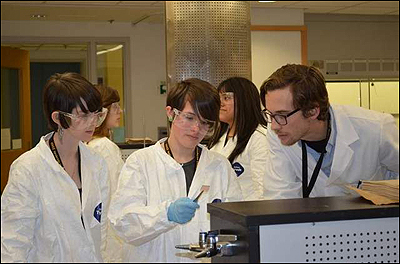How can you squeeze electricity from a blackberry?
A group of Siegel High students will be among those able to answer the question after making solar cells out of blackberry juice and measuring the electrical power produced as part of an educational outreach program sponsored by the Vanderbilt Institute of Nanoscale Science and Engineering.

Siegel students are among others from 20 Tennessee high schools that will participate in daylong field trips to the VINSE laboratories on the Vanderbilt campus this spring to get hands-on experience in science and technology .
“This gives the students a hands-on introduction to the power of nanotechnology,” said VINSE director Sandra Rosenthal, who serves as Vanderbilt’s Jack and Pamela Egan Professor of Chemistry. “Many scientists and engineers believe that structuring solar cells on the nanoscale will lead to more efficient, less expensive devices that will encourage more widespread implementation of solar power.”
The students will mash blackberries, extract their juice, soak an electrode in the juice, coat another electrode with graphite and clip them together to make a solar cell. After the solar cells are finished, the students get to measure the amount of electricity that each produces to see which cell performs best.
The devices don’t produce a lot of electricity — about enough to power a small electronic calculator — but can give a person a small shock.
During the trip to VINSE, students will examine materials they used to make the solar cells with a scanning electron microscopes. These instruments can magnify objects by as much as 500,000 times, enough to see nanoscale features that are 50,000 times smaller than the width of a human hair. Students also will learn how these tiny features can affect how much sunlight a solar cell can capture.
“Hands-on experience in an area of national importance such as renewable energy sources helps students see a connection between what they are studying and real-world problems,” said Philippe Fauchet, dean of the Vanderbilt School of Engineering. “VINSE’s relevant and engaging experiments may very well be the spark that inspires high school students to study science and engineering and pursue careers in those fields.”
The field trips are funded by a statewide program called TN-SCORE, which is designed to boost energy-related research and education across the state. The program is supported by a $20 million award from the National Science Foundation’s Experimental Program to Stimulate Competitive Research.